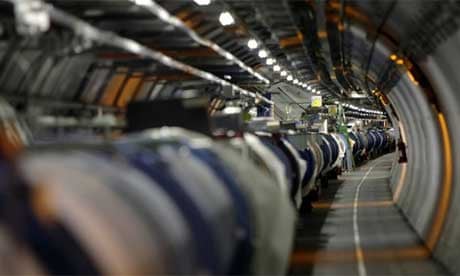Theory can sometimes seem to be a long way ahead of experiment. Forty-eight years passed between the postulation of the Brout-Englert-Higgs mechanism (by which particles could have mass yet still respect the symmetries required of a reasonable quantum field theory), and the discovery of the Higgs boson (the physical evidence that the mechanism actually operates in nature). And forty-nine before the survivors, Englert and Higgs, received the Nobel Prize. That's quite a lead.
I work on ATLAS, one of the experiments (along with CMS) at the CERN Large Hadron Collider that found the Higgs boson, and I wrote about the physics Nobel Prize, awarded last Tuesday, as soon as we found out. (Which was sooner, it seems, than Peter Higgs heard the news...)
That article has been interpreted by some as a bit of a gripe about theory taking precedence over experiment in the prize stakes. This wasn't the intent. It was meant as a bit of a gripe about the myth of the lone genius. So it goes.
This present article is indeed about the roles of theory and experiment, though it is not a gripe.
The reason I'm writing this now is actually because of this paper which popped up on the arXiv (the place where physicists post their work for everyone to read for free). As a postdoc in Hamburg in the 1990s, I worked on measuring hadronic jets produced in collisions between photons and protons, making the first measurement of them about twenty years ago*. One of the cool things you can learn from such measurements is the strength of the strong nuclear force, what we call the coupling, αs. Quarks are the fundamental constituents of protons, neutrons and all the other hadrons. Gluons are the bosons which carry the strong nuclear force. The strong coupling, αs, is a number which describes how likely quarks and gluons are to interact with each other.
We extracted this number from our measurements, but this extraction was limited by the precision of the theoretical calculations (only Next-to-Leading-Order, NLO). Now, about twelve years after our most precise measurements and a lot of calculation by theorists, the Next-to-next-to-leading-order (NNLO) result is available, and the theory is now about as precise as the measurement.
There are many theorists who made a lot of very difficult calculations which were needed in the Higgs discovery too. You might say that there is a big difference between a flash of insight and a difficult calculation. You'd be right, but the depth of understanding required for both is often similar. In fact, now we have found a Higgs boson, calculations of the couplings have become very important and interesting indeed, as they determine the emergent properties of the Standard Model pf particle physics at even higher energies.
So, which is the bestest, theory or experiment? I utterly agree with Vanessa Heggie that without theory, experiment can mislead. And it seems obvious that without experiment, theory is mere maths-enhanced speculation.
Vanessa's article finishes with
If theories can influence the way we interpret data, is it possible that the Higgs Boson might also turn out to be a total lemon?
Well, not a total one. There's a bump there, that is a new phenomenon. And it couples to the W and Z bosons in the way a Higgs boson should. So even if the theory evolves, Brout, Englert and Higgs (and Hagen, Guralnik and Kibble) hit on an effective version that describes nature to some decent approximation. No scientist can honestly ever claim more.
But the theory may change the interpretation of the data, for sure. Just as the data may change the credibility of the theory. Moving from lemons to a different culinary analogy, which do you want first, your chicken, or your egg?
* With the ZEUS experiment at the HERA collider at DESY. And yes, I was part of a team, though quite a small one in this case.

Comments (…)
Sign in or create your Guardian account to join the discussion